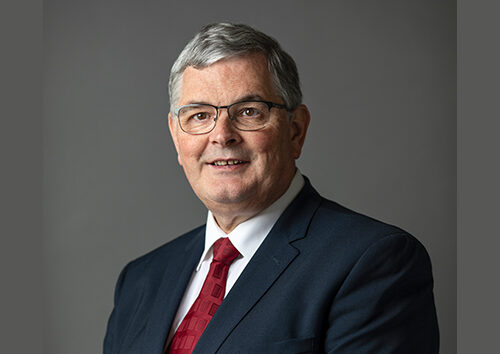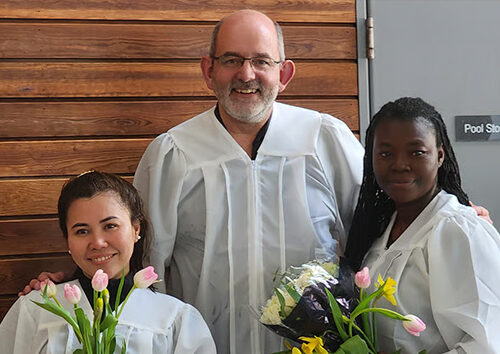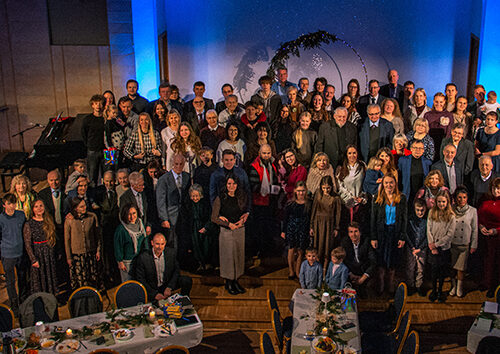23 November 2020 | St Albans, UK [John Surridge] The Trans-European Division Year-End meetings are a highlight in the calendar for church leaders from the twenty-two European countries that make up its territory. For decades these meetings, usually located in very pleasant surroundings, have provided an opportunity for fellowship, spiritual uplift and refocusing on the mission of the Church.
But COVID-19 changed everything. Flights and venue bookings were cancelled, and guests were informed that, sadly, the meetings would have to take place by Zoom.
Organisers realised that this would be a disappointment for everyone, as there is nothing quite like personal interaction for building fellowship and a sense of unity, but they also sensed an opportunity. A number of sessions were reserved for addressing the COVID issue, and guest speakers were tasked with exploring both its challenges and its benefits.
A group of lay representatives gave a presentation based on the Barna report into COVID-19. Perhaps the most shocking finding was the impact that COVID has had on mental health, particularly that of young people. According to the report, nearly half of all young people now suffer from anxiety, and a third get depressed. Their spiritual life is also affected. Following a cohort of young people aged 18 to 29 who had grown up with a faith, the study found that just 10% of them were resilient disciples.

Understanding the experiences of young people gives insights into the ways that they can be reached under lockdown conditions. Most of them have grown up as consumers, watching events rather than being a part of them. Transitioning church services to online digital platforms can make matters worse, but there are lessons to be learned. “We should look at our screens as a lens, which can focus at different depths,” said presenter Christine Burt. “We need to evaluate our online events and see how we can improve them. People need to be involved, to take part, to feel that they are actually with other people rather than just observing them; they need to become part of a real community.”
 In the discussion which followed, examples of good practice came from all over the TED. E-honours for Pathfinders and Adventurers, run by Dejan Stojkovic from the British Union Conference (BUC), has been particularly successful.
In the discussion which followed, examples of good practice came from all over the TED. E-honours for Pathfinders and Adventurers, run by Dejan Stojkovic from the British Union Conference (BUC), has been particularly successful.
In the Netherlands, most online services are being run by young people, as it is they who have the best skills in this area. Clair Sanches-Schutte reported on the successes of Children’s Ministries, with the younger ones adapting most quickly to the new technology. Victor Marley reported from Norway on creative online fundraising events which have succeeded because they kept their focus on local communities. Hilde Huru, from the very north of Norway (which is not currently in lockdown), told of how her very secular community was opening up to Christianity in the wake of COVID. “Recently,” she said, “one-third of the people who visited our church on Sabbath were not Adventists, and half of those had never been to a church before.”
 General Conference President Elder Ted Wilson concluded the first day’s meetings with an upbeat and gospel-centred message. “Meeting electronically is not the same as being in the lovely location we usually enjoy, but this hardly costs anything, and we get to stay at home!” he said. He went on to speak of some of the challenges other fields are facing with COVID, but instead of dwelling on these, he reflected on the “I Will Go” strategic plan, which has been adopted by the General Conference. Inspired by young people in Argentina, the slogan “I Will Go” has caught the imagination of the World Church as we work together to share the Three Angels’ Messages. Using the language of Isaiah 6, Elder Wilson concluded, “I encourage each one of you to respond to the Lord today and encourage our church members with the words, ‘I will go’.”
General Conference President Elder Ted Wilson concluded the first day’s meetings with an upbeat and gospel-centred message. “Meeting electronically is not the same as being in the lovely location we usually enjoy, but this hardly costs anything, and we get to stay at home!” he said. He went on to speak of some of the challenges other fields are facing with COVID, but instead of dwelling on these, he reflected on the “I Will Go” strategic plan, which has been adopted by the General Conference. Inspired by young people in Argentina, the slogan “I Will Go” has caught the imagination of the World Church as we work together to share the Three Angels’ Messages. Using the language of Isaiah 6, Elder Wilson concluded, “I encourage each one of you to respond to the Lord today and encourage our church members with the words, ‘I will go’.”
Three other devotional speakers gave encouragement and inspiration during the Year-End meetings. Laurence Turner gave an exposition of the seven parables of the kingdom, in Matthew 13, making the point that the sower in the parable is not just any sower, but actually Jesus Himself. Knowing this is the secret for having a good harvest.
 Lidija Djordjevic Runic, pastor of the Central Belgrade church and lecturer at Belgrade Theological Seminary, gave a fascinating insight into the golden calf, how God’s people wanted Him to be physically present with them, and were unable to cope with His absence. Moses pleaded for their lives, even offering his own in exchange, thus illustrating what it truly means to resemble God.
Lidija Djordjevic Runic, pastor of the Central Belgrade church and lecturer at Belgrade Theological Seminary, gave a fascinating insight into the golden calf, how God’s people wanted Him to be physically present with them, and were unable to cope with His absence. Moses pleaded for their lives, even offering his own in exchange, thus illustrating what it truly means to resemble God.
 Julian Thompson, who is a lecturer at Newbold College as well as completing his doctoral studies at Oxford, spoke on Jeremiah’s call to ministry. He painted a picture of Jeremiah as an “ancient near eastern millennial” and drew comparisons with the millennials of today. Millennials can be confident and driven but may also be narcissistic. They are not always the most reliable people to work with. However, with God working as a mentor, like Jeremiah they can do a great work for Him.
Julian Thompson, who is a lecturer at Newbold College as well as completing his doctoral studies at Oxford, spoke on Jeremiah’s call to ministry. He painted a picture of Jeremiah as an “ancient near eastern millennial” and drew comparisons with the millennials of today. Millennials can be confident and driven but may also be narcissistic. They are not always the most reliable people to work with. However, with God working as a mentor, like Jeremiah they can do a great work for Him.
As is usual at the Year-End meetings, policy matters were discussed and voted. These are not usually the most exciting items for most of those present, but there was considerable interest in the changes which had been voted by the Annual Council to facilitate virtual meetings in the future. Model constitutions had been significantly revised to make sure that another COVID-like event does not catch us off guard in the future.

When TED Treasurer Nenad Jepuranović presented the financial report and budget, people certainly did sit up and take note. No doubt many were bracing themselves for the huge financial toll that COVID must have taken on the Church. The figures and meticulously crafted graphs and charts did show a financial downturn, but it was nowhere near as great as people were expecting or had been predicted by financial experts. The TED acted quickly when COVID struck and were able to make significant cuts which mitigated the loss of income, but remarkably, tithe for some of the fields within the TED actually increased during the first nine months of 2020. Several people, including the treasurer, commented on the incredible resilience and faithfulness of the members.
 Norwegian Union Treasurer Johann Johannsson told several stories which explained this level of faithfulness. Throughout his years in treasury he and his colleagues have gone to great lengths to be open and transparent with the members. “People trust us,” he said, and went on to tell of a member who had given over two million euros to the Church. However, this trust was tested last year when an oversight led to a government grant of some 600,000 euros going unclaimed. This was a disaster for the Union, but instead of trying to hide the fact, the mistake was communicated with the whole membership. They prayed for the leaders of the Church and, in the end, the government paid the money retrospectively – something which had never happened before. “Honesty, openness and transparency, together with modern technical solutions and a willingness to move forward, are key to building trust and confidence across the church,” Johann concluded.
Norwegian Union Treasurer Johann Johannsson told several stories which explained this level of faithfulness. Throughout his years in treasury he and his colleagues have gone to great lengths to be open and transparent with the members. “People trust us,” he said, and went on to tell of a member who had given over two million euros to the Church. However, this trust was tested last year when an oversight led to a government grant of some 600,000 euros going unclaimed. This was a disaster for the Union, but instead of trying to hide the fact, the mistake was communicated with the whole membership. They prayed for the leaders of the Church and, in the end, the government paid the money retrospectively – something which had never happened before. “Honesty, openness and transparency, together with modern technical solutions and a willingness to move forward, are key to building trust and confidence across the church,” Johann concluded.
 Mfakazi Ndebele is a lay pastor from London, England. For the concluding inspirational presentation, he told the story of how God had led him, 20 years ago, to combine his professional work as an IBM Solutions Architect with ministry. He began by paying tribute to his wife and daughter who have supported him all the way through, and also to the Seeds conference and Andrews University, which “fired him up” for ministry. In 2002 Mfakazi started the SureWay Community Church, based on the church planting methods of Russell Burrill. This was organised as a church in 2011. Not content to continue developing this church, which could now stand on its own, Mfakazi went on to plant a second church, known as The Oasis. The key in both cases was community involvement. Youth clubs, football competitions, business breakfasts, and Holiday Bible Schools, were all used to break down barriers and build relationships. With numerous examples Mfakazi spoke of bridges built, lives changed, and hearts given to the Lord in baptism. He concluded, “The answer to our challenges is not in employing more pastors, but in realising the potential of the people who are sitting in the pews of our church.”
Mfakazi Ndebele is a lay pastor from London, England. For the concluding inspirational presentation, he told the story of how God had led him, 20 years ago, to combine his professional work as an IBM Solutions Architect with ministry. He began by paying tribute to his wife and daughter who have supported him all the way through, and also to the Seeds conference and Andrews University, which “fired him up” for ministry. In 2002 Mfakazi started the SureWay Community Church, based on the church planting methods of Russell Burrill. This was organised as a church in 2011. Not content to continue developing this church, which could now stand on its own, Mfakazi went on to plant a second church, known as The Oasis. The key in both cases was community involvement. Youth clubs, football competitions, business breakfasts, and Holiday Bible Schools, were all used to break down barriers and build relationships. With numerous examples Mfakazi spoke of bridges built, lives changed, and hearts given to the Lord in baptism. He concluded, “The answer to our challenges is not in employing more pastors, but in realising the potential of the people who are sitting in the pews of our church.”
As the participants waved goodbye to each other on their electronic devices, there was no doubt that some missed the warmth and fellowship of previous years, eating and talking together in the comfort of a Montenegro conference centre. However, the presentations had been just as inspiring – more so perhaps in view of the COVID crisis. In that respect, at least one could perhaps say that these Year-End meetings had been virtually the same.
tedNEWS Staff: Victor Hulbert, editor; Deana Stojković, associate editor
119 St Peter’s Street, St Albans, Herts, AL1 3EY, England
E-mail: [email protected]
Website: www.ted.adventist.org
tedNEWS is an information bulletin issued by the communication department of the Seventh-day Adventist Church in the Trans-European Division. Readers are free to republish or share this article with appropriate credit including an active hyperlink to the original article.



